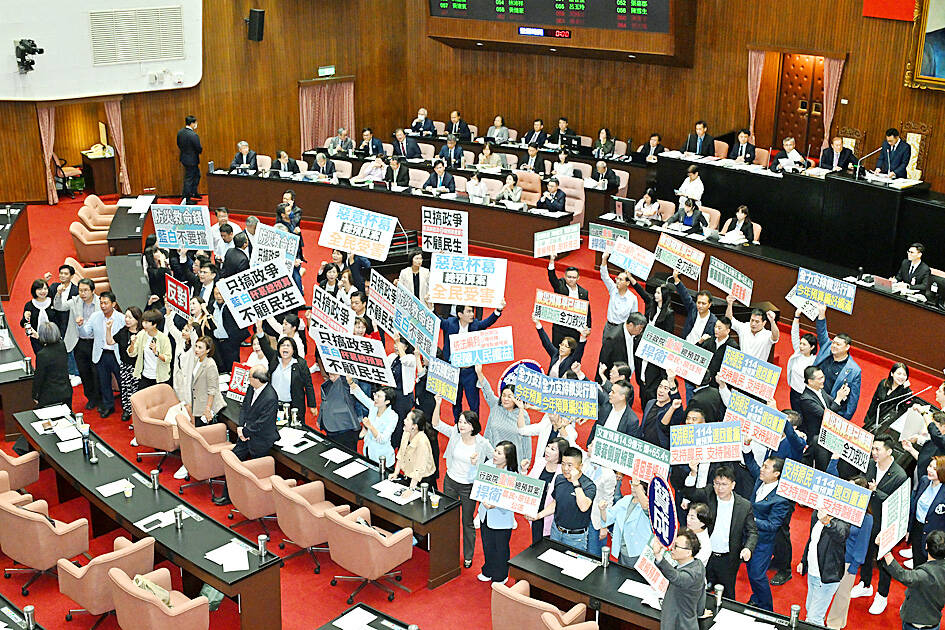The legislative review of the central government budget for fiscal year 2025 remained stalled yesterday, with opposition lawmakers demanding that the Cabinet revise its spending plan before permitting discussions to proceed.
During the legislature’s full session, the opposition Chinese Nationalist Party (KMT) and the Taiwan People’s Party (TPP), which hold a combined majority in the 113-seat legislature, supported a motion to restrict the agenda to the original items.
Fifty-six of the 106 lawmakers in attendance voted in favor of the motion proposed by the TPP, effectively excluding the ruling Democratic Progressive Party (DPP) caucus’ proposal to include a review of the spending bill.

Photo: Tien Yu-hua, Taipei Times
The bill, which had its review rejected for the third time since the new session of the legislature began on Sept. 20, is to be sent back to the Procedure Committee for further discussions next week.
Premier Cho Jung-tai (卓榮泰) said the lawmakers’ decision was “regrettable and frustrating.”
The KMT and TPP legislative caucuses said they returned the bill to the Procedure Committee, because the budget plan finalized in mid-August does not cover funds required by an amended law and resolutions passed earlier.
Both parties have demanded the Cabinet submit a revised budget that addresses the expected rise in compensation due to the amended Logging Ban Compensation for Lands Reserved for Indigenous Peoples Act (原住民保留地禁伐補償條例), and other legislative resolutions, such as hiking the price for government acquisition of public food stocks.
For the logging issue, the opposition said the legislature amended the act on June 4, raising annual compensation from NT$30,000 per hectare to NT$60,000 per hectare (US$938.59 to US$1,877) next year, which should increase the budget set aside for compensation from NT$2.1 billion per year to NT$4.2 billion per year.
However, the Council of Indigenous Peoples only lists NT$2.81 billion for compensation payments in its budget, which is below the estimated amount of money needed under the amended law, they said.
The Cabinet resubmitted the central government budget for review without making any of the changes called for by the opposition.
KMT Legislator Sra Kacaw during the legislative session said that Cho could introduce a supplementary budget to resolve the deadlock.
However, Cho said that such a solution is not feasible, as it would render national budget planning meaningless.
“If a proposal or law automatically leads to increased spending, it will hinder future budget planning, causing the budget to expand uncontrollably,” Cho said.
The Budget Act (預算法) stipulates that the budget must be approved by the legislature one month before the new fiscal year begins on New Year’s Day.
However, the review process has often concluded in the new year, as was the case for the 2022 and 2023 budgets, which were passed in January.

CAUTION: Based on intelligence from the nation’s security agencies, MOFA has cautioned Taiwanese travelers about heightened safety risks in China-friendly countries The Ministry of Foreign Affairs (MOFA) yesterday urged Taiwanese to be aware of their safety when traveling abroad, especially in countries that are friendly to China. China in June last year issued 22 guidelines that allow its courts to try in absentia and sentence to death so-called “diehard” Taiwanese independence activists, even though Chinese courts have no jurisdiction in Taiwan. Late last month, a senior Chinese official gave closed-door instructions to state security units to implement the guidelines in countries friendly to China, a government memo and a senior Taiwan security official said, based on information gathered by Taiwan’s intelligence agency. The

Taiwan Semiconductor Manufacturing Co (TSMC), the world’s largest contract chipmaker, said yesterday that it is looking to hire 8,000 people this year, at a time when the tech giant is expanding production capacity to maintain its lead over competitors. To attract talent, TSMC would launch a large-scale recruitment campaign on campuses across Taiwan, where a newly recruited engineer with a master’s degree could expect to receive an average salary of NT$2.2 million (US$60,912), which is much higher than the 2023 national average of NT$709,000 for those in the same category, according to government statistics. TSMC, which accounted for more than 60 percent

Tung Tzu-hsien (童子賢), a Taiwanese businessman and deputy convener of the nation’s National Climate Change Committee, said yesterday that “electrical power is national power” and nuclear energy is “very important to Taiwan.” Tung made the remarks, suggesting that his views do not align with the country’s current official policy of phasing out nuclear energy, at a forum organized by the Taiwan People’s Party titled “Challenges and Prospects of Taiwan’s AI Industry and Energy Policy.” “Taiwan is currently pursuing industries with high added- value and is developing vigorously, and this all requires electricity,” said the chairman

The National Immigration Agency (NIA) said yesterday that it will revoke the dependent-based residence permit of a Chinese social media influencer who reportedly “openly advocated for [China’s] unification through military force” with Taiwan. The Chinese national, identified by her surname Liu (劉), will have her residence permit revoked in accordance with Article 14 of the “Measures for the permission of family- based residence, long-term residence and settlement of people from the Mainland Area in the Taiwan Area,” the NIA said in a news release. The agency explained it received reports that Liu made “unifying Taiwan through military force” statements on her online